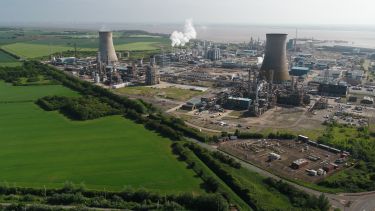Carbon capture
Banner hidden
Reducing CO₂ emissions from heavy industry.
Using carbon capture to decarbonise the UK economy.
This is the future.
And it will be Sheffield made.
Decarbonising industry with carbon capture
Our research looks at ways to reduce and even eliminate carbon dioxide emissions from fossil fuel power plants and heavy industry.
Carbon capture, utilisation and storage (CCUS) is a group of technologies designed to capture CO₂ from emissions sources, such as fossil fuelled power plants, and prevent it from being released into the atmosphere. Once captured, the CO₂ can be either re-used in various products, such as cement or plastics (utilisation), or stored permanently in geological formations deep underground (storage).
The University of Sheffield's Translational Energy Research Centre enables industrial and academic partners both regionally and nationally to develop, demonstrate and test low-carbon energy technology solutions. The centre helps researchers and innovators to gain the necessary commercial confidence before committing to large scale trials for solutions that will remove and reduce carbon and introduce other energy sources like hydrogen and bioenergy.
The University is a founding member, and host to the UK Carbon Capture and Storage Research Centre (UKCCSRC), which supports, strengthens and integrates the UK CCS community. The Centre is a vital link with industry, aligning CCS research with business needs to secure an attainable economic future for the technology.
We are also the lead UK institution in the International CCS Test Centre Network, we host the UK Centre for Carbon Dioxide Utilisation (CDU) and manage CO₂Chem – the world’s largest networking and research community for academics and industrialists interested in CO₂.
To stay up to date with the latest world-changing advances from the University of Sheffield, sign up to receive our briefing.


